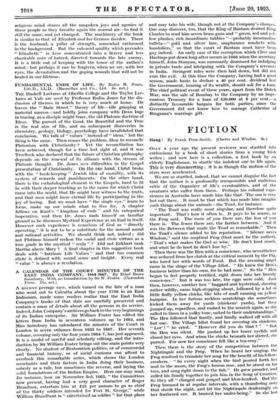FUNDAMENTAL ENDS OF LIFE. By Rufus M. Jones, Litt.D., LL.D.
(Macmillan and Co., Ltd. 6s. net.)
Tan Haskell Lectures at Oberlin College and the Taylor Lec- tures at Yale are used by Professor Rufus Jones for the dis- Cussion of themes in which he is very much at home. He leaves the " Main Street " theory of life—idle grasping at material success—and boldly joins company with Dean Inge in tracing, as a disciple might trace, the old Platonic doctrine of ideas. The pursuit of the Good, the Beautiful and the True is the real aim of life, and no subsequent discoveries in chemistry, geology, biology, psychology have invalidated that conclusion. We talk of " values " instead of " ideas," but the thing is the same. Then comes the problem, How to reconcile' Platonism with Christianity ? Yet the reconciliation has been achieved, though for a time lost sight of, and it was Troeltsch who declared that the future of Christian philosophy depends on the renewal of its alliance with the stream of Platonic thought. Dr. Jones sees difficulties in the Gospel presentation of Christianity. On the one hand, Christ broke with the " book-keeping " Jewish idea of morality, with its system of rewards and punishments. On the other hand, there is the eschatological element in the Gospels, hard to fit in with their deeper teaching as to the cause for which Christ came into the world, that He might bear witness to the truth, and that men might have eternal life by participating in the joy of loving. But we must have " the single eye," learn to focus, make up our minds what to live for. A chapter follows on Kant's " kingdom of ends " and his categorical imperative, and then Dr. Jones finds himself on familiar ground as he discusses Mystical Experience as an End in itself. However such experience is conscious of God as " directly operating," it is not to be a substitute for the normal moral and rational activities. We should think not, indeed ; did not Plotinus himself reckon the social and civic virtues as a true grade in the mystical " scala " ? Did not Eckhart rank Martha above Mary ? A final chapter in this suggestive book deals with " Intrinsic Life Values " and that too common cliché is defined with sound sense and insight. Every real " value " is always a revelation.










































 Previous page
Previous page